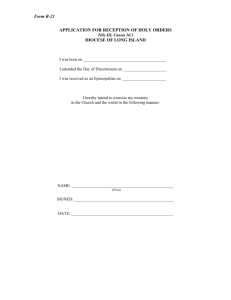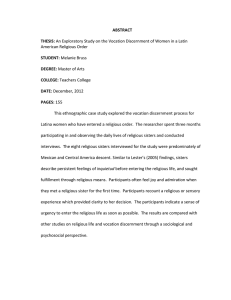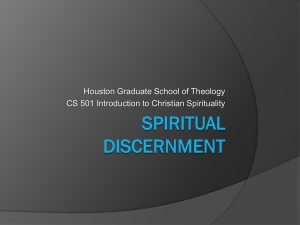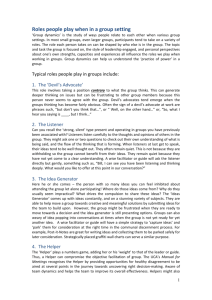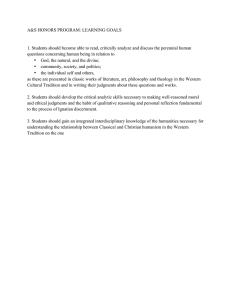T O W A R D C O... D I S C E R N M E N... S O M E P R A C... S U G G E S T I O N...
advertisement
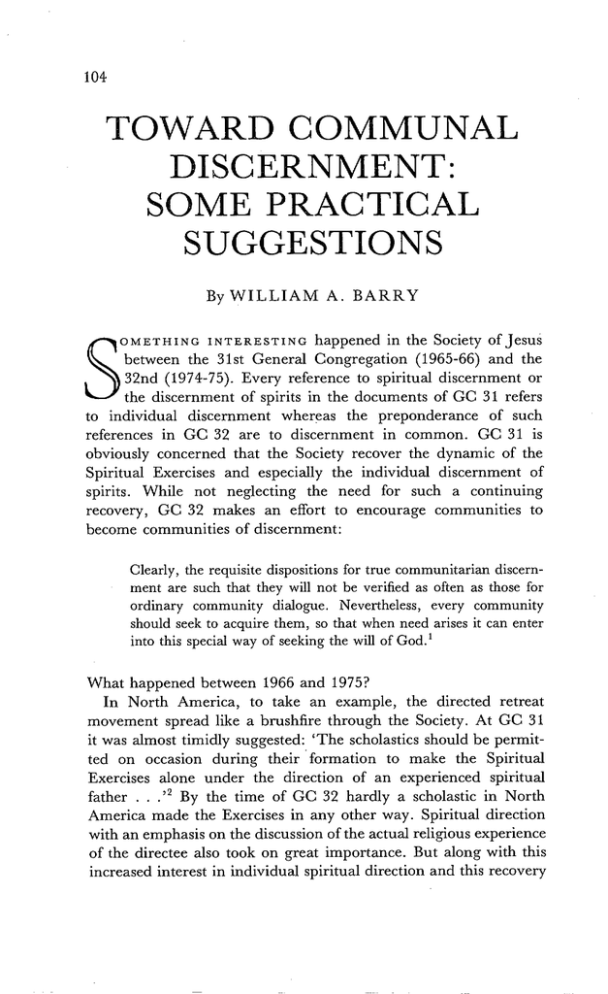
104 TOWARD COMMUNAL DISCERNMENT: SOME PRACTICAL SUGGESTIONS By W I L L I A M A. BARRY OMETHING INTERESTING h a p p e n e d in the Society of Jesus b e t w e e n the 31st G e n e r a l C o n g r e g a t i o n (1965-66) and the 32nd (1974-75). E v e r y reference to spiritual d i s c e r n m e n t or the d i s c e r n m e n t of spirits in the d o c u m e n t s of G C 31 refers to individual d i s c e r n m e n t whereas the p r e p o n d e r a n c e of such references in G C 32 are to d i s c e r n m e n t in c o m m o n . G C 31 is obviously c o n c e r n e d that the Society recover the d y n a m i c of the Spiritual Exercises and especially the individual d i s c e r n m e n t of spirits. While not neglecting the n e e d for such a c o n t i n u i n g recovery, G C 32 makes an effort to e n c o u r a g e c o m m u n i t i e s to b e c o m e c o m m u n i t i e s of discernment: S Clearly, the requisite dispositions for true communitarian discernment are such that they will not be verified as often as those for ordinary community dialogue. Nevertheless, every community should seek to acquire them, so that when need arises it can enter into this special way of seeking the will of God.1 W h a t h a p p e n e d between 1966 and 1975? In N o r t h America, to take an example, the directed retreat m o v e m e n t spread like a brushfire t h r o u g h the Society. At G C 31 it was almost timidly suggested: ' T h e scholastics should be permitted on occasion d u r i n g their f o r m a t i o n to m a k e the Spiritual Exercises alone u n d e r the direction of an experienced spiritual father . . .,2 By the time of G C 32 h a r d l y a scholastic in N o r t h A m e r i c a m a d e the Exercises in any other way. Spiritual direction with an emphasis on the discussion of the actual religious experience of the directee also took on great i m p o r t a n c e . But along with this increased interest in individual spiritual direction and this recovery TOWARD COMMUNAL DISCERNMENT 105 of the original intention of St Ignatius in giving the Exercises also went a renewed interest in other aspects of Ignatian spirituality. The Institute of Jesuit Sources under George Ganss began publishing English translations of original Jesuit documents, the most important being the appearance in 1970 of Ganss's own translation of the Constitutions. 3 The Institute also made available in translation such scholarly works as de Guibert's The Jesuits: their spiritual doctrine and practice4 and began publishing original studies that made it possible for English-speaking Jesuits to recover their spiritual heritage. Finally in 1969 the American Assistancy Seminar on Jesuit Spirituality under the direction of George Ganss began publishing the very influential monograph series, Studies in the Spirituality of Jesuits. Thus, the Society in North America responded to the call of Vatican II and GC 31 that religious try to recover the charism of their founders. Very early in the Studies series, in April 1970, 'Ignatian discernment' by J o h n Futrell appeared. 5 This monograph, based on Futrell's doctoral dissertation, focussed not only on individual discernment but also on communal discernment modelled on the deliberation that led to the founding of the Society of Jesus. A year and a half later Jules Toner's 'A method for communal discernment '6 was published by Studies to be followed in November, 1972 by Futrell's ' C o m m u n a l discernment: reflections on experience'. 7 Finally, in J u n e 1974, Toner's 'The deliberation that started the Jesuits: a commentary on the Deliberatio primorum patrum, newly translated with a historical introduction '8 made its appearance. Since that time nothing more on communal discernment has appeared in the Studies series. Even a cursory reading of these four publications makes it clear that Futrell, Toner and other Jesuits were giving numerous workshops on communal discernment to groups of religious. During these same years William J. Connolly of the Centre for Religious Development in Cambridge, Massachussets was in demand to conduct similar workshops and introduced me to the process when together we facilitated such a workshop for all the Jesuit superiors of tile New England Province in 1972. In short order I was asked to facilitate a number of such workshops in New England and abroad. A stint as vice-provincial for formation took me out of circulation for such work until 1984 when, with Joseph McCormick, I was asked to work with the Jesuits of a large urban area to help them move toward communal discernment. What 106 TOWARD COMMUNAL DISCERNMENT intrigues me is the silence about communal discernment since t h e surge of interest in the early nineteen-seventies which culminated in the call of GC 32. Was it just a flash in the pan? Or is communal discernment still going strong, but silently? For some time I have had close to hand my folder with detailed process notes on the workshops in which I was involved. I wanted to describe the process as I saw it with the hopes that such a description would be helpful to others. The invitation in 1984 and work with those Jesuits over the year 1984-85 have given me the impetus to write this article. If the process of communal discernment has in fact fallen into disuse, perhaps we need a stimulus to bring it back into use. In 1970 Futrell argued strongly .that the times required a recovery of the Ignatian practice of communal discernment: If true communal discernment of experiments to enable the Society of Jesus to renew itself and to adapt to the signs of the times today is a condition for the survival of the Society in the modern Church, then it is vital that all Jesuits learn to engage in authentic Ignatian communal discernment. 9 Some sixteen years later, I believe, the need is still there, and not just for Jesuits. I have entitled the article 'Toward C o m m u n a l Discernment' quite deliberately. M a n y of the workshops in which I have participated have not reached the point of engaging in true communal discernment either because no question for discernment arose or because of lack of time or because other things needed to happen first. I suspect that m a n y attempts at communal discernment falter for lack of the prerequisites outlined by both Futrell (1970 and 1972) and Toner (1971). Since both of these men have provided relatively detailed outlines of the actual process of discernment they use once these prerequisites are attained, I want to concentrate on the process of moving toward that attainment. C o m m u n a l discernment presupposes before all else that those who will engage in it have experienced the discernment of spirits in themselves. That is, each individual must have engaged in a process of contemptative prayer such as that proposed in the Spiritual Exercises and have experienced the movements of the different 'spirits' and have discerned which movements were of God, which not. Secondly, communal discernment presupposes TOWARD COMMUNAL DISCERNMENT 107 that the individuals can and will c o m m u n i c a t e to others their experiences in p r a y e r and in prayerful reflection. T h e ability to do so c a n n o t be p r e s u p p o s e d since m a n y of us older religious were b r o u g h t u p in a tradition where such c o m m u n i c a t i o n was not only not e n c o u r a g e d but often e n o u g h actively discouraged. T h e recovery of the individually directed retreat and the d e v e l o p m e n t of a type of spiritual direction which requires the c o m m u n i c a t i o n of religious experience are giving us the tools for the kind of c o m m u n i c a t i o n c o m m u n a l d i s c e r n m e n t requires. But the willingness to c o m m u n i c a t e experience must also be present, and this is often the rock u p o n which attempts at c o m m u n a l d i s c e r n m e n t shatter. Let m e elaborate on this point. W h e n will a n y of u s - - u n l e s s we are inveterate narcissists-reveal o u r intimate selves to others? Is it not w h e n we trust the other, trust the other not to laugh or scorn or d o w n p l a y o u r experience? Suppose y o u start to tell m e a b o u t an experience of p r a y e r that m e a n t s o m e t h i n g to you and swiftly I change the subject or say: ' T h a t sounds odd to m e ' . It will be a long time before y o u will take the chance again. W h e n people a p p r o a c h a counsellor for help because they are deeply troubled, they will test the waters with h i m or her before they reveal their intimate selves. A n d directees only gradually reveal the most intimate aspects of their relationship with G o d as they c o m e to trust their spiritual directors. So it is not easy to entrust o u r i n n e r experience to others. I f this is the case in one-to-one relationships, how m u c h m o r e difficult to reveal ourselves in a group. In an earlier article I attributed a great deal of this difficulty to fear and offered a couple of approaches to o v e r c o m e the fear. 1° I do not want to repeat myself here. R a t h e r I will develop m o r e at length some of the processes we have used to help people in groups to entrust themselves m o r e to one another. First we explain the role of the facilitators by an analogy to the role of the spiritual director. T h e spiritual director helps individuals to recognize their desires with r e g a r d to the L o r d , to m a k e these k n o w n to the L o r d , and to put themselves into a receptive position so that the L o r d ' s response m a y be heard. T h e spiritual director does not m a n u f a c t u r e desires or p r a y e r experiences for the directee but helps the person to notice what is h a p p e n i n g in the relationship with the L o r d , to discern what leads t o w a r d the L o r d and to decide what to do a b o u t the discernment. So too the facilitators of the 108 TOWARD COMMUNAL DISCERNMENT group try to help the group to articulate its desire as a group with regard to the L or d and to help them to approach the L ord in prayer with that desire. H e r e it is important to remind the individuals that they are asking the Lord to relate to them precisely as members of this group with the group's desire. Just as individuals ask the Lo r d for what they desire, trusting that the Lord has their good at heart, so too the individuals in this group context approach the Lord with the group's desire trusting that the L ord has the good of this group at heart. T h e facilitators suggest a way for the individuals to approach the Lord in prayer. After the prayer period is over, they return to the group. T h e facilitators then help them to report to one another as much or as little as they wish of what happened during the prayer. Just as the spiritual director of an individual helps the person to notice and articulate what happened as much as possible without judging it, so too the facilitators of a group ask the group to try to listen without j u d g m e n t to the experiences shared. Indeed, since the assumption of such group sharing is that we are hoping to hear what God is saying to us as a group, these periods of sharing are approached, as far as possible, with the same contemplative attitude one hopes to have in private prayer. Secondly, we point out that the process is a slow one of growing in trust in the L or d and in one another. T h e y already trust the Lord, but they probably have not thought much about the Lord's desires and hopes for the group as such. And most groups need to develop a trust in one another as deeply prayerful and honestly searching for G od's will for the group. C o m m u n a l discernment means that each m e m b e r of the group trusts that God will reveal his will for the group through their individual prayer and through their sharing of the fruits of that prayer. T o engage in this process I must trust that all the others are sincerely praying and trying to remain open to discern G o d ' s will. After all, my future is on the line since I am willing to abide by the group's decision. We have usually structured the day into three sessions, morning, afternoon and evening. T h e whole group gathers at the beginning of each session, and we give them some orientation for private prayer. Each one prays for forty-five minutes to an hour and then takes a few minutes for reflection. If the group is less than ten, all the sharing sessions are in one group. If it is larger, we break it up into groups of ten or less for the sharing and ask that someone summarize for the whole group in a report. Each session, therefore, TOWARD COMMUNAL DISCERNMENT 109 lasts at least two-and-a-half hours. As the process goes on, we m a y have to v a r y the s t r u c t u r e according to what is needed. For example, at the b e g i n n i n g of a session we m a y need to canvass the group to find out what their desires are. Some groups begin the d i s c e r n m e n t process with m u c h good will toward one another. E v e n so the individuals will still need time to develop the d e e p e r trust in one a n o t h e r and the L o r d that this process entails. Suppose that such a group's purpose is to discover how they might best use their talent apostolically. T h e i r n u m b e r s have declined and they feel strained and o v e r w o r k e d and realize that they can no longer continue to do all the work that they have b e e n doing. W e would suggest for the first period of p r a y e r that they use a text like Isaiah 43,1-7: Fear not, for I have redeemed you; I have called you by name, you are mine. When you pass through the waters I will be with you; and through the rivers, they shall not overwhelm you; when you walk through fire you shall not be burned, and the flame shall not consume you. • For I am the Lord your God, the Holy One of Israel, your Saviour. Because you are precious in my eyes, and honoured, and I love you, I give men in return for you, peoples in exchange for your life. Fear not, for I am with you. W e indicate that the Israelites h e a r d this consoling word when they were in exile, their temple destroyed and their hopes at their lowest. W e suggest that they ask the L o r d to give t h e m a sense of h e a r i n g these words as applying to t h e m as m e m b e r s of this group. T h e y then p r a y privately for forty-five minutes o r so and afterwards r e t u r n to the group where each one is asked to share w h a t e v e r he or she wishes of what h a p p e n e d d u r i n g the prayer. For most groups such an 'ice b r e a k e r ' is reassuring and the variety of experiences enlightening. In a felt way they realize how sincere and faith-filled each one is. T h e y are often surprised at how easy and enjoyable it is to talk a b o u t p r a y e r with one another. D e p e n d ing on how this first session goes, we might either suggest a repetition for the next session or suggest that they ask the L o r d to 110 TOWARD COMMUNAL DISCERNMENT help them to know his dreams for them as a group. During the group meetings we remind them to listen to one another contemplatively and to note inner reactions as they listen. If they feel antipathy to what one member is saying, for example, they might want to ask the Lord's help to see things from that person's perspective. After the group has articulated its vision and dream as best it can, they might be ready to ask the Lord's help to discover what blocks them from realizing the dream. Now the hard part begins because they will be addressing neuralgic issues that may bring to light resentments, mistrust, and other 'negative' emotions. The facilitators now begin to earn their keep. Any group that has a history together has got some bodies buried somewhere. We have been talking about groups who begin the process with much good will toward one another. Often enough, however, groups do not begin with much good will and trust. Then the negative feelings may have to be addressed even earlier. One group displayed so much anger, resentment, suspicion and misunderstanding at the very first session that even the facilitators wondered whether they had opened Pandora's box. But we pointed out that their reality had surfaced rather quickly and suggested that they might feel as the apostles did after the crucifixion when they boarded themselves up in the upper room. Imagine their feelings of guilt and anger and suspicion and fear. And into their midst came Jesus saying 'Peace be with you'. We suggested that they might want to spend an hour in prayer with this text (Jn 20,19-23) and then return. When they returned to the group, the atmosphere had noticeably shifted. Where before accusations and angry denunciations of others prevailed, now each one spoke of his own fears and failings and at the same time voiced a trust that the Lord would be with them. We had not yet reached the promised land, but we were on the way toward becoming a group that eventually might be able to engage in communal discernment. In his 1972 monograph Futrell makes a perceptive comment: 'A community must have achieved the fruit of the First Week of the Spiritual Exercises as a community in order to begin true communal spiritual discernment'. 11 He does not spell out what that might mean, but I believe that this prerequisite is crucial, and in at least one case, I believe, I sa~v a group achieve that fruit. It yeas a group of male religious who were chapter delegates. They asked Joseph McCormick and me to facilitate a four-and-a-half day process that would help them toward being more discerning and open during TOWARD COMMUNAL DISCERNMENT 111 the chapter which would follow. T h e congregation was reeling from a h e a v y financial blow and f r o m d e p a r t u r e s that h a d left them demoralized, a n g r y and suspicious. A m o n g the m e m b e r s of the group were some w h o m the others held responsible for their problems. Early in o u r sessions feelings of anger, suspicion, guilt and helplessness e m e r g e d . T h e first two days were stormy, b u t we could sense a gradual growth in trust. As one m a n said: ' W e have thought the u n t h i n k a b l e and said the u n s a y a b l e ' . T o w a r d the end of the second d a y we s u m m a r i z e d the situation in this fashion: You sense yourselves as broken, needy, helpless, and sinful precisely as members of this congregation and as chapter delegates. A number of you have identified with Simon the Pharisee who scorned Jesus for letting the sinful woman wash his feet. Some of you have voiced resentment at being put into the position of picking up the pieces of a mess caused by others. Some have voiced fears that as a group you will not have the courage to make the necessary decisions. Some fear that even God cannot change you. And yet you have also desired healing, have desired that Jesus make you brothers again. We suggest that you present yourselves to jesus as you are and ask him for what you want. Perhaps you might want to do a repetition of Luke 7,36-50 or you might want to use the washing of the feet in John 13. W e also suggested speaking to J e s u s on the cross and using the triple colloquy of the First W e e k of the Exercises. T h e sharing after this period of p r a y e r was v e r y emotional and v e r y honest. O n e m a n asked with tears for the forgiveness of the group. A n o t h e r r e p o r t e d emptiness in p r a y e r and asked the group to p r a y for him. A couple of m e n said that the desire for healing was growing in t h e m . M o s t of the others r e p o r t e d consolation and a sense of being healed. T e a r s were shed. At the e n d of the sharing they broke u p into dyads for reconciliation. T h e next d a y m e n c o n t i n u e d to ask one a n o t h e r for reconcilation. W e s p e n t the last two days focussing on J e s u s ' relationship with his apostles in the gospel of M a r k . At the end of the process they felt hopeful and m u c h m o r e trusting as they p r e p a r e d to enter their chapter. As a result of the 'First W e e k experience' they seemed able to d r e a m and to hope again as a group. I f spiritual directors need to have great trust in the L o r d as their directees face some of the v e r y painful and h a r r o w i n g experiences sometimes associated with the process o f conversion, it is even 112 TOWAP,.D COMMUNAL DISCERNMENT more imperative for those w h o facilitate groups toward c o m m u n a l discernment. It is all too easy to gloss over serious divisions in a group, to let sleeping dogs lie, as it were. It is all too easy to present techniques that only can work if prerequisites of trust and contemplative prayer are present. It is also all too easy to give up hope that the Lord can work his wonders even on a group that seems at first hopelessly divided. Perhaps they do want to be healed as a group. I have never b e e n a facilitator alone precisely because I feel the need for another so that together we can remind one another to pray ourselves and to entrust t h e group to the Lord and to trust the good will of the group in spite of everything. After all, we try to say to one another, they have invited us to help them to b e c o m e a discerning group; so they must have some hope in the Lord w h o was called them together. A group is close to b e c o m i n g discerning w h e n the members can say, as one m a n did, ' D u r i n g the Spiritual Exercises I came to trust deeply that Jesus had a dream for me. N o w I believe that he has a dream for u s ' . NOTES 1 Decree 11, 'The union of minds and hearts', of the 32nd General Congregation of the Society, paragraph 23. In Documents of the 31st and 32nd General Congregation of the Society of Jesus (St Louis, Institute of Jesuit Sources, 1977), p 475. 2 Decree 8, 'The spiritual formation of Jesuits', of the 31st General Congregation of the Society of Jesus, paragraph 124, in Documents of the 31st and 32nd General Congregations of the Society of Jesus (St Louis, Institute of Jesuit Sources, 1977), p 108. :~ Ignatius of Loyola, The Constitutions of the Society of Jesus, trans George E. Ganss (St Louis, Institute of Jesuit Sources, 1970). de Guibert, Joseph: The Jesuits: their spiritual doctrine and practice. A historical study. Trans W. J. Young (St Louis, Institute of Jesuit Sources, 1964). 5 Futrell, John Carroll: 'Ignatian discernment', Studies in the spirituality ofJesuits, II, 2 (April, 1970). 6 Toner, Jules J.: 'A method o f communal discernment of God's will', Studies in ~the spirituality of Jesuits, III, 4 (Sept, 1971). 7 Futrell, John Carroll: 'Oommunal discernment: reflections on experience', Studies in the spirituality of Jesuits, IV, 5 (Nov, 1972). s Toner, Jules J. : 'The deliberation that started the Jesuits: a commentary on the Deliberatio primorum patrum. Newly translated with a historical introduction', Studies in the spirituality of Jesuits, VI, 4 (June, 1974). 9 Futrell, op.cit., (1970), p 70. I0 Barry, William A.: 'Religious community: a diagnosis and a prescription', Review for Religious, 1985, 44, pp 405-409. IJ Futrell, op.cit., (1972), p 169. (3393/86) Printedby Hobbsthe Printersof Southampton NOTES ON CONTRIBUTORS BRIAN O'LEARY S.J. holds a doctorate in spiritual theology from the Gregorian University, Rome. He presently resides at Manresa House, Dollymount, Dublin. His work includes research in Ignatian spirituality, lecturing at the Milltown Institute of Theology and Philosophy, and the ministry of spiritual direction. DERMOT MANSFIELDSJ. is attached to the Jesuit Centre of Spirituality at Manresa House, Dollymount. Among other works undertaken there he has contributed for some years to the training programmes for spiritual directors. Previously, he was attached to the Jesuit House of Studies at Milltown Park, and to the former Retreat House at Rahan, Tullamore, Co Offaly. PAUL EDWARDSS.j. a graduate of Oxford and Bristol universities, spent most of his working life at St Michael's College, Leeds where he was Senior History Master, then DeputyHead and, after an inte~'val in the Bristol University Chaplaincy, teacher-chaplain. From 1978-84 he was Master of Campion Hall in the University of Oxford and is now on the staff of St Beuno's Spiritual Exercises Centre, North Wales. PAMELA HAYES R.S.C.J. is a member of the English province of the Society of the Sacred Heart. She studied history and then theology before postgraduate studies in spirituality. For many years she was Principal Lecturer in Religious Studies at St Mary's College, Fenham, Newcastle upon Tyne, and a member of the Shap Working party on World Rel'igions. She is now engaged in a ministry of lecturing in spirituality and guiding retreats, mainly in the North-East of England. OLGA WARNKE I.B.V.M. has had a distinguished teaching career in French literature at St Michael's College in the University of Toronto. She has worked extensively in the ministry of spirituality and directed retreats in Canada, USA and Ireland. In 1985 she was made Doctor of Divinity honoris causa at Regis College in the School of Theology at the University of Toronto. DAVID TOWNSEND S.J. worked in Schweppes Research Laboratories before entering the Society of Jesus. After ordination to the ministerial priesthood he studied counselling at Keele University. He is on the staff of the St Beuno's Spiritual Exercises Centre, North Wales, and has directed retreats, workshops and long courses in North America and in Southern Africa. WILLIAM BARRY S.,J. was born in 1930 of Irish immigrant parents, entered the Society of Jesus in 1950 and was ordained in 1962. He has a PhD in clinical pyschology from the University of Michigan. He taught pastoral theology at YVeston School of Theology, Cambridge, Mass. from 1969-78 and was co-founder of the Center for Religious Development, Cambridge. Since 1978 he has been working in religious formation and spiritual direction. SIGLA OLD T E S T A M E N T Gen Exod Lev Num Deut Jg Ruth 2, 2 Sam 1, 2 Kg 1, 2 Chr Neh Est Job Ps Prov Jos Ezr Qoh (Eecl) Cant Isai Jer Lain Ezek Dan Hos Joel Amos Obad Jon Mic Nah Bar Hab Tob Zeph (Soph) Jud Hag Wis Zech Sir (Ecclus) Mal 1, 2 Macc NEW T E S T A M E N T 1, 2 Cor Gal Eph Phil 1, 2 Tim Col Tit 1, 2 Thess Phm Mt Mk Lk Jn Acts Rom Exx The Spiritual Exercises of St Ignatius Loyola. MHSJ Monumenta Historica Societatis Jesu. Heb Jas 1, 2 Pet 1, 2, 3 J n Jude Apoc

